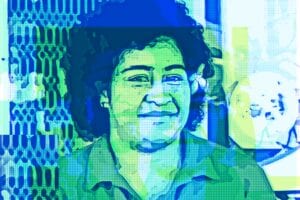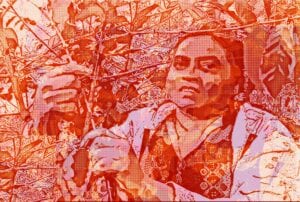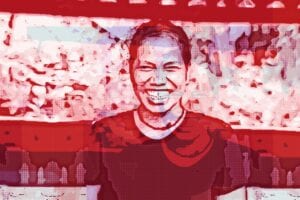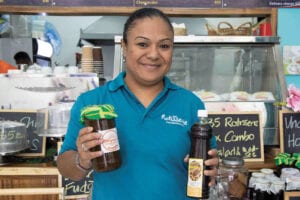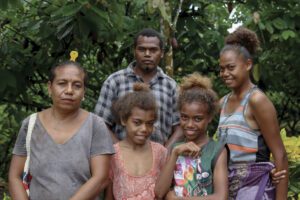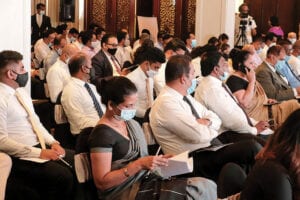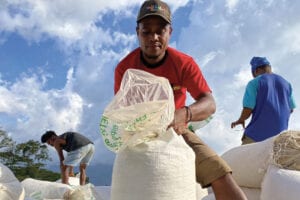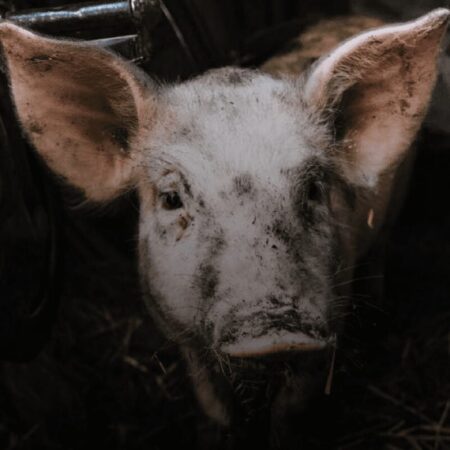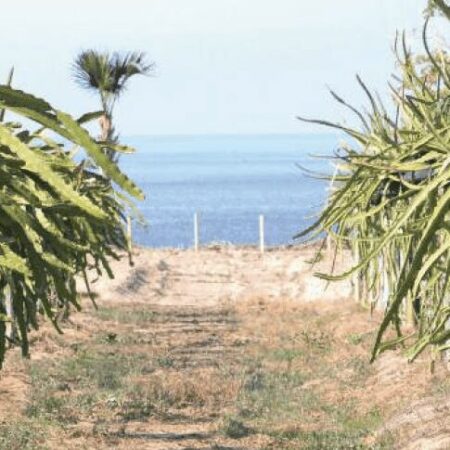MDF interventions
benefitted
people
stimulated
in Private Sector
Investment
generated
in additional
income
and positively
impacted
women
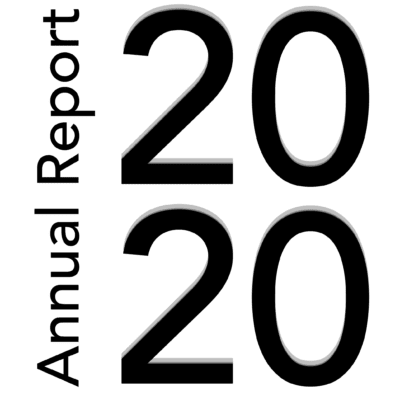

MDF interventions
benefitted
people
stimulated
in Private Sector
Investment
generated
in additional
income
and positively
impacted
women
Annual Report 2020
Scroll down for highlights and features from the MDF Annual Report 2020
Pro Poor Growth Stories
Covid Case Studies
Thought Leadership

Delivering opportunity amid a pandemic
With the COVID-19 pandemic reaching Fiji, households dependent on tourism lost their main, and in many cases, only source of income. For women, this loss of income is particularly burdensome when coupled with unpaid care duties and domestic work. Filling the employment gap and helping local food vendors stay afloat is MDF partner Shazcom Technology. The company devised an innovative business model of mobile food ordering and delivery in the middle of the pandemic.
The ‘Fiji Eats’ app tapped into an under-met need for easy-access food delivery in Fiji, while also providing muchneeded employment opportunities in the tourism-dependent city of Nadi. MDF Fiji spoke with Shazcom’s Karisitiana Vukivuki to find out how COVID-19 affected her family and their livelihood.
“When COVID-19 struck Fiji, it made a lot of changes. My siblings worked at the airport and a hotel and were laid off. There was literally no one working at home.”
– Karisitiana, Call centre agent, Shazcom.
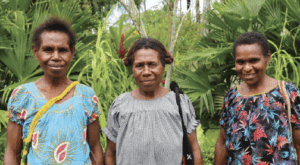
The long road to sustainable coffee in PNG
Life in rural Papua New Guinea is not the same as it was a decade ago. Basic living standards have improved as a result of many factors, such as promising new industries. In inland PNG, coffee farming has been a major contributor to this change. Coffee provides income and improves traditional village ways of life by helping the community access amenities, such as electricity. For smallholder farmer Catherine Abaida, who have advanced from cultivating to aggregating coffee, the sector has changed her life. Catherine is a single mother from rural Menyamya in Morobe Province. With three children to support, she farmed vegetables and sold them at the Menyamya government station to provide for her household. However, her earnings were not enough to meet her family’s needs.
“I made about 40 to 50 kinas (USD11-13) a fortnight, and that was enough for basics like oil, soap and salt. But I could not save enough for my children’s school fees, and most of the time I would ask my relatives to assist me. We have land in the village, so we farmed vegetables and relied on our garden.”
– Catherine Abaida
When Catherine’s parents passed on, she inherited a block of land with coffee trees and in 2004, she started farming coffee. Over time, her income from this endeavour grew. Seeing this, Catherine planted an additional 500 trees in 2008, extended her coffee garden, and invested more time and resources into coffee farming.
However, Catherine and most coffee farmers in her village never received any formal training on improved methods of farming or other important complementary skills, such as financial management, that would help them increase their productivity and income.
In 2020, as part of MDF’s work in the coffee market system, the PNG country team partnered with Morobe Mountain Coffee Export Limited (MMCEL) to support coffee farmers to produce high quality coffee beans in remote areas of Morobe, including Watut, Wau, Bulolo and Menyamya. The intervention introduced a coffee certification program designed to help coffee farmers meet international farming standards and obtain a referenceable accreditation. Becoming a certified coffee producer connects farmers to a higher-end market in which they can charge a higher price for their coffee beans.
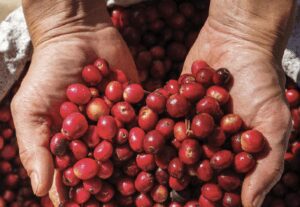
Brewing innovation:
Direct private sector linkages are changing the game for smallholder coffee farmers in Sri Lanka
Farming specialty coffee in Sri Lanka has significant growth potential but the industry is underdeveloped. One reason for this is that unlike ECC, most coffee bean buyers only purchase processed green beans. The responsibility to process cherries lies at farm level, a task which is very labour intensive when done manually. For over a year, MDF has been working with the private sector on a unique solution to the farmers’ problem – a globally competitive cherry-purchasing business model to replace the traditional green bean model. This market intervention allows farmers, many of whom are women, to sell high quality coffee cherries, earning higher incomes and saving time that was previously spent on drying the cherries into green beans. from the reduced workload and additional income that comes from supplying to the Ella Coffee Cooperative through the cherry-purchasing business model.
I suffer with a kidney illness, so it is dry coffee. It is easier to sell to ECC, since they come to my doorstep to collect the coffee cherries that I have harvested.
– Karunawathy, Coffee farmer.
Coffee farming offers Karunawathy a stable source of additional income. She uses this wage to pay for her medical expenses. This steady, guaranteed source of income has proven vital for most farmers who are increasingly inclined to grow more coffee due to these benefits. After only three months of selling to ECC, another coffee farmer, Bandara, says he is reassured about the prospects of growing coffee.
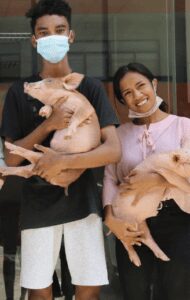
Communicating for change: Saving pigs in Timor-Leste
African Swine Fever (ASF), a highly contagious pig disease, appeared in Timor-Leste in September. 2019 and has since killed approximately 50,000 pigs. Pigs are ubiquitous in Timor-Leste. The animals are an economic commodity, as well as a social one and are used as food, gifts and markers of social status. Since pig rearing is practiced by most rural households, this ASF outbreak presents a major threat to livelihoods and the economy as a whole.
This prompted MDF to collaborate with Timor’s Ministry of Agriculture and Fisheries (MAF) to launch an awareness campaign on the disease. In addition to spreading information about ASF, the initiative promotes pig rearing best practices and biosecurity to reduce the spread of the virus and prevent pig deaths. With the help of MAF, technical experts and the Australian Department of Agriculture, MDF developed engaging, informative communications material. The project required engagement with multiple media platforms, close collaboration with market stakeholders and strategic thinking. The ultimate goal of the MDF-MAF awareness initiative is to bring about positive behavioural and social change to reduce ASF-related pig deaths.
The team determined that an effectively designed communications campaign with appropriately targeted key messages would reach the intended audience strategically. The campaign has been a resounding success. MDF began the project by determining the target audience, that is, households who raise pigs. This group includes both male and female farmers, who live in urban and rural areas and speak Tetun, as well as other local languages.
The campaign is based on a series of key messages drafted with pig rearing practices in mind and, specifically, what pig farmers should or should not do. The communications informed recipients what ASF is, how to keep pigs from contracting the virus, what to do when pigs are sick or dying, and how to safely transport pigs.
As part of the ASF awareness campaign, informational text messages were sent to the 600,000 subscribers of telecommunications provider, Telemor. Of these, close to 16,000 subscribers registered to receive more information. Through this text messaging platform, farmers continue to receive information on pig feeding, pen building and cleaning, how to bury and report dead pigs, and other ASF prevention methods.
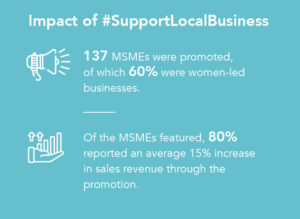
Rallying support for local small businesses
On 2 January 2020, Felisha Tuiloma opened the doors to her new restaurant, The Rotisserie, on the outskirts of Fiji’s capital, Suva. The opening was cause for celebration, as for many years Felisha and her husband had dreamed of starting their own business.
Despite a good start, just over two months later, Fiji recorded its first case of COVID-19. In early April, Suva went into a two-week lockdown and business took a turn for the worse.
“There was a bit of a spike in business at first because a lot of people were after deliveries, but then we saw a drop. We were at 50 percent,” explained Felisha. “We knew we had to get creative because we had just opened – there was no way that we were going to close! We had to change our menu, we needed to look at our costs, we needed to look at our pricing and the way we did things. Quitting was not an option,” she added.
Another local businesswoman, Sera Ranadi, who has operated a popular seafood stall in the bustling Nausori market since 2017, shared similar sentiments:
“Before COVID-19, it was smooth. People would visit my stall and I would earn around USD200 (AUD216) during the week. After COVID-19 hit us, it went down to USD100 (AUD130). It was hard and I had to adjust.”
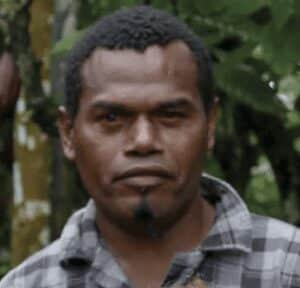
Resilience in the face of a pandemic
Arnold is a lead cocoa farmer in the small village of Napapar, inland of the Papua New Guinean province of East New Britain. As the pandemic hit PNG, Arnold was more scared of dying of COVID-19 than of his bags of fermented cocoa never making it to market.
“I had no idea about this new disease that people were talking about! When I read that it was caused by a virus and that it was already among us, I thought we were going to drop dead like chickens everywhere,” Arnold confessed.
PNG’s first locally transmitted case of COVID-19 was confirmed in April 2020 in East New Britain, causing panic and chaos among locals. To control the spread of the virus, the province was shut down for about a month. Like most households in his village, Arnold’s family relies mainly on cocoa for income. Arnold’s eldest daughter is in college and most of his savings from cocoa are put aside for her fees. During the lockdown, Arnold was not able to sell any of his fermented cocoa and had to store it instead, which reduced his income. Arnold, his wife and their three daughters had to survive by eating their garden produce.
When the pandemic reached PNG, MDF’s immediate response was to gather market intelligence from its extensive networks in the agriculture sector. MDF saw that accurate information about COVID-19 was not reaching rural people. The majority of PNG’s population live in rural areas and have limited or no access to the latest information or news; many people, including farmers, were not even aware of the lockdown or of the global COVID-19 outbreak.
To help farmers like Arnold understand more about the virus and how to protect themselves while continuing to safely farm and sell their produce, MDF PNG partnered with agribusiness Outspan Limited to launch an awareness campaign.
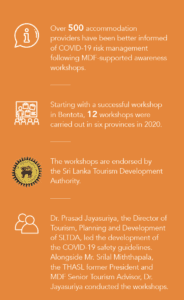
Resilience in the face of a pandemic
Harini De Costa, Personal Assistant to the General Manager of the Grand Hotel in Nuwara Eliya, says the hotel responded quickly when COVID-19 hit the country.
She said, “the General Manager called a panel discussion with staff members to discuss how we were going to respond. Social distancing and other health and safety mechanisms were implemented immediately, as per advice from the local Public Health Inspector (PHI).”
Some hotels experienced more adverse consequences than others. Kasun De Silva, Assistant Resort Manager of Anantaya Resort and Spa in Chilaw, says the hotel closed down soon after the onset of the pandemic. The resort was careful to adhere to the quarantine process guidelines suggested by the local PHI strictly and promptly.
However, despite its best efforts and proactive measures, the hotel was stigmatised by the surrounding community because the virus was regarded as ‘foreign’ and tourism businesses were seen as contaminated.
“We used to do a lot of Corporate Social Responsibility projects for the village, but we had to stop,” said Kasun.
Both hotels participated in the THASL-MDF awareness workshops in their respective regions. The sessions aimed to help accommodation providers understand the importance and procedures of health and safety measures, enabling them to better prepare for and obtain SLTDA’s ‘Safe and Secure’ COVID-19 safety standard certification. Properties are required to have this certification to receive international visitors when borders reopen. Harini says the workshop acted as a welcome steppingstone for the hotel’s recovery in this crucial and trying period.
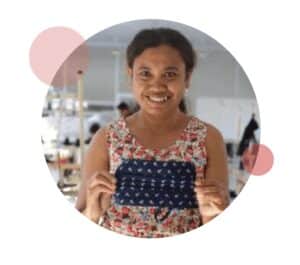
Using networks and agile management to overcome pandemic restrictions
Like businesses everywhere, MDF partners in Timor-Leste had to cope with a diverse range of setbacks in 2020. The COVID-19 pandemic resulted in many challenges, but import and transportation restrictions were particularly difficult for the agricultural sector, most notably for coffee exports and agri-input imports.
In 2020, MDF Timor-Leste worked with partners to adjust expectations, timelines, contracts and payment terms. In addition to adapting existing interventions, MDF implemented several new initiatives to help Timorese businesses and the government adjust to the changing business environment.
In the coffee industry, the pandemic caused fluctuations in global pricing and demand patterns. Travel restrictions affected the availability of key technical and managerial personnel, coffee company operations employees, farmers and farm workers within Timor-Leste. MDF worked with the government, the national coffee association and individual firms to determine and implement the most effective short- and long-term responses to the business crisis. One simple but impactful form of support facilitated the travel of coffee companies’ key personnel to Timor-Leste to arrange the purchase of coffee as part of the 2020 harvest. Without this, thousands of poor Timorese farmers might not have been able to sell their crop or been forced to accept lower prices.
Making the multi-country model work
Market Systems Development (MSD) programs, like other aid modalities, are effective when they are implemented well. Conversely, like other aid modalities, MSD programs can meander and achieve little when implemented poorly. More than others, MSD programs are sensitive to the quality of the implementation team. That was the constraint that MDF was designed to address.
The silent crisis: African Swine Fever
While COVID-19 dominated attention in 2020, another crisis was unfolding in parallel, with the potential to have an even greater impact on poor women and men in the Pacific, particularly in PNG and Timor-Leste: the highly contagious African Swine Fever (ASF). In Timor-Leste, around 82 per cent of households raise pigs, which are used for cultural ceremonies and as a part of the store of wealth ? pigs make up a significant part of the asset base for many rural households. In PNG, about 600,000 households in the Highlands region alone rear nearly 1.8 million pigs, providing an irreplaceable source of protein and, like Timor-Leste, contributing a significant proportion of the household?s asset base.
In Timor-Leste, MDF has been the main vehicle for delivering the Australian Government?s ASF response. First, through a major nation-wide communications campaign, MDF reached a significant proportion of the population, resulting in changed pig rearing practices and, therefore, avoided pig losses for tens of thousands of households. Second, MDF is supporting the private sector to introduce practices that not only prevent the spread of the disease, but also increase the productivity of pig farms. This includes increasing the supply of quality feed and better pig breeds, as well as using pig pens instead of allowing pigs to forage.
In PNG, there are a number of initiatives, such as PHAMA Plus and the Food and Agriculture Organization, that are looking at the biosecurity implications of ASF and supporting public communications campaigns. MDF is therefore approaching the problem from a different angle. Many of the factors that help raise productivity of pig farms also help prevent the spread of ASF. To complement the efforts of other programs, MDF is supporting the increased use of improved feed, which supports pig growth but also reduces the spread of the disease as it minimises wild foraging. The same applies to using pig pens. MDF is also working to increase the supply of healthy piglets with a faster growing breed variety; this will help restock the national herd while improving farmer incomes. These interventions are discussed in greater detail in Timor-Leste and PNG country chapters.
The smallholder challenge
Agriculture inevitably employs fewer people over time. Rural-urban migration has occurred for centuries, and farming in developed economies has become a capital-intensive, low-labour endeavour. Yet smallholder farmers are not going anywhere any time soon: around 500 million smallholders produce approximately 30 per cent of the world?s food supply. And farm size has actually decreased in lower income countries over the past 50 years. At the same time, the global food system is becoming more capital intensive.
Returns from agriculture have accrued to capital and skill-intensive parts of the agri-food supply chain rather than to smallholders. This discourages investment in farm productivity and creates a situation where, counterintuitively, some of the world?s most in-demand products, such as cocoa, are increasingly reliant on economically precarious farming systems. At the same time, consumer demand for affordable but better food ? higher quality, traceable provenance, environmental and ethical standards ? requires (and rewards) more farm efficiency and innovation. How to square this circle?
